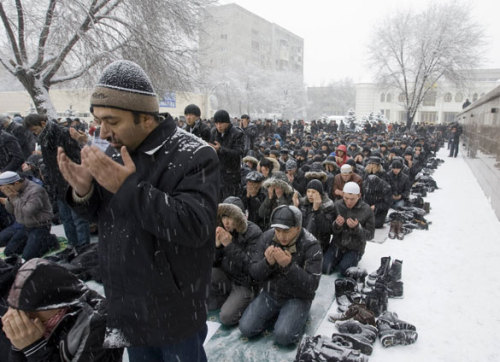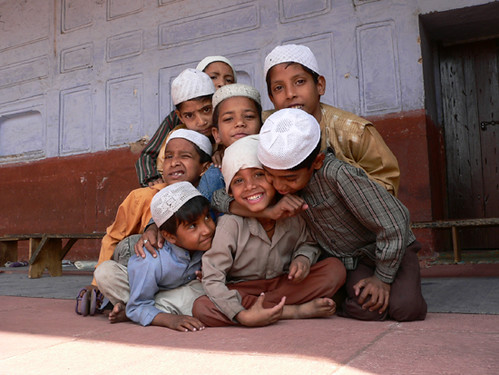An excellent article in Masud's blog has appeared, and I quote it here:
Sexualisation of society
"A while back, on a Facebook thread, the poster said:
“Never really thought or even realized how much haram there is in Bollywood music videos. Just as much objectification of women as most hiphop videos. It probably aint a good idea to have those videos playing in family restaurants either…My God!!!”
The poster was not an Indo-Pak but I thought that this was a good starting point for a discussion on the issue of sexualisation of society and sexualising media and entertainment.
We know that the sexualiation of society has been going on in the West for decades now, so much so that not much is left that is shocking or taboo anymore. Music videos in particular, and particularly RnB and HipHop seem to be overtly lewd in their form and content and Bollywood isn’t far behind if at all.
Take two old Indian (pre-Bollywood) films about courtesans – the 1972 Pakeezah and the 1981 Umrao Jaan – both dealt with the very difficult subject matter of young girls and women being sold into sexual slavery. With much subtlety, tact and taste, bothe films told two wonderful and deeply sad stories and were masterfully filmed and directed. The two directors didn’t need to appeal to the lowest common denominator and titillate the audience. I suppose the times were different and people wouldn’t have put up with what would then be called lewdness, but it goes to show you CAN make films about such subject matters without descending into lurid and lewd visuals.
In Islamic and indeed in normative and traditional eastern cultures, sex and sexuality is for the private domain and not for the public sphere and this was reflected on screen in such scenes in which a couple approached one another for an intimate moment the camera either panned away or the shot is obscured by a prop or faded to black to reinforce this social and moral convention.
It is utterly disconcerting that, with the prevalence of satellite and cable TV, many South Asian Muslim homes will have Bollywood channels on with all their leery, soft-porn antics there for all to see and not think to flip the channel over. Whilst adults can (and this is highly questionable) perhaps not be affected by such sexually charged imagery, children, on the other hand are. Such images will normalise and desensitise these children to such behaviour and we do see some of that today. Muslim kids previously would have a lot of shame and decorum when it came to sex and sexuality to such a degree that a pre-emptive channel change would occur when one suspected and impending on-screen kiss.
It is important, for morality and particularly Muslim morality, that we instill in our children a sense of shame and embarassament when it comes to sexuality but this must be tempered against the need to discuss matters of a sexual variety when the need arises. What we are ashamed of is crass and open sexuality not sexuality per se.
In a recent New York Times article http://nyti.ms/nvUkSm the author said “When asked to describe a moral dilemma they had faced, two-thirds of the young people either couldn’t answer the question or described problems that are not moral at all, like whether they could afford to rent a certain apartment or whether they had enough quarters to feed the meter at a parking spot. ” This is worrying, we are raising a generation of people who have no idea what morals (and perhaps ethics) are, there is an erosion of these values going on and the first step is the over sexualisation of society and bringing sexuality into the public sphere. Studies have shown that clothes companies are also guilty of this, many companies produce clothes that sexualise young girls, they produce skimpy tops, mini-skirts, make-up, padded bras for pre-pubescent girls, high-heel shoes and all sorts see http://bit.ly/n6yjpc and http://www.guardian.co.uk/society/2010/apr/16/children-clothing-survey-bikini-heels and http://www.mumsnet.com/campaigns/let-girls-be-girls
The question has to be asked, why society at large has not picked up on this and voiced their concerns? If stores are stock such thing it means that they are selling. Young girls themselves are not buying these items so it must be mums who are buying such things for their young girls. The worrying thing here is that the mums quite clearly don’t see anything wrong in sexualised clothing for their young daughters and the question has to be asked, why? One reason, I am sure, is the fact that the notion of shame and embarassament has gone out of society and the media has helped condition and groom society into shedding shame about sex and sexuality, much to the detriment of society at large. They have taken something private and intimate and put it on display for all and sundry.
“Innocent” programmes like “Hannah Montana” and other pre-teen “girlie” TV shows are quite insidious and pernicious, whilst outwardly they show very strong willed independent young girls who seem in control of their own affairs and destiny, the underlying theme is rebellion which is reinforced by very permissive and passive parental characters in these shows. The other danger here is that young girls from 4 or 5 years and upwards start to indentify with the character and the actor portraying them and grow up with the show and then follow the career of the actor. The actor becomes a role model and as we have seen in the case of the actor playing Hannah Montana – Miley Cyrus – they inevitably end up displaying rampant and unfettered sexuality, in their private as well as their professional lives as soon as they are legally allowed to remove their clothes on-screen. The claim by such actors is that they are comfortable and not ashamed of their bodies and it is through “choice” that they are willing to display their bodies and be sexualised, when the fact of the matter is that they have been conditioned or more accurately groomed for such an eventuality by their agents and by their producers.
Our boys are also affected by what I have mentioned. Studies by psychologists have shown that men see bikin-clad women as objects see:
http://articles.cnn.com/2009-02-19/health/women.bikinis.objects_1_bikini-strip-clubs-sexism?_s=PM:HEALTH
New research shows that, in men, the brain areas associated with handling tools and the intention to perform actions light up when viewing images of women in bikinis. The research was presented by a professor of psychology at Princeton University.
http://articles.cnn.com/2009-02-19/health/women.bikinis.objects_1_bikini-strip-clubs-sexism?_s=PM:HEALTH
New research shows that, in men, the brain areas associated with handling tools and the intention to perform actions light up when viewing images of women in bikinis. The research was presented by a professor of psychology at Princeton University.
Access to sexual material is not difficult with the advent of the internet and many parents just do not know what they children get up to online. As useful as the Internet is, it is a double-edged sword and parents must be vigilant. One worrying trend I have noticed amongst young boys in general is machismo and with that comes the disrespect and the objectification of women. And again there media and popular culture and the passivity of parents is to blame. We have to instill in our boys the respect for women from an early age, how we do this, I don’t know but one of the key elements is for the father to be the role model. His behaviour towards women will colour his sons’ attitude to women. Certainly, peer-pressure and friends will also have a bearing on their psyche, so it is important to know who their friends are. It is also important to stress morals and decorum and certainly talk and counsel your boys about such issues.
Jason Evert a well known Catholic lecturer gives this excellent short talk on the question “Should Christian women wear bikinis?” in which he cites the aforementioned research.
http://youtu.be/WtzIcz7MOkc
http://youtu.be/WtzIcz7MOkc
I am certainly no expert on these issues, I am a concerned parent of two teenage boys and 7 year old girl. Alhamdulillah, I seem to have navigated this minefield with my boys and I pray that they maintain their morality and sense of shame. I have discussed many things with them in this regard and I have always try to encourage discussion. I have also made it clear that Muslims don’t do girlfriend/boyfriend and we have always spoken about marriage from an early age. As parents we have to embed our ideas first and help make them firm in their hearts and minds.
What is important is to SPEAK TO YOUR CHILDREN and speak to them regularly and then listen to them too. If you want to get them through this it has to be in partnership with them, you have to make them understand you. And finally and by no means least, make dua for them after every salat, that Allah grants them a sense of shame and decorum, and to protect them from that which displeases Him."




